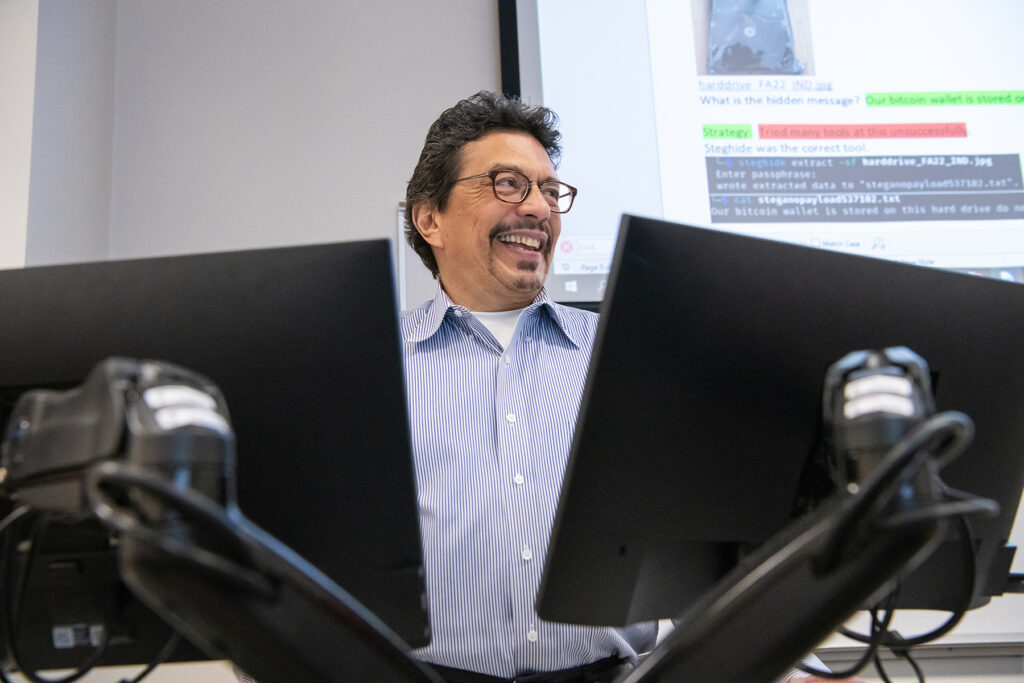
HACKING THE GAP
Center earns stamp of excellence while training students to halt cyberthreats
By Anthony Lane | Illustration by Dave Cutler | Photography by Tanya Fabian
July 17, 2023
INSIDE A CSU PUEBLO computer lab, Kayla Urias inspects an image on her laptop screen. A train is passing under a bridge in a nondescript cityscape. Her cybersecurity challenge is like an action thriller: Someone from the fictional “nefarious liber8tion hacking group” has posted the train picture online, according to a contest narrative, and Urias must identify the bridge location to stymie a fabricated threat. It’s as if she is trying to thwart a real ring of hackers out to sabotage a transit system.
Urias is among 38 students competing on a cybersecurity team called the CSU Pueblo CyberWolves, a clever take on the school’s athletics teams, called the ThunderWolves. The CyberWolves have thunder of their own: The highly ranked team is the face of a CSU Pueblo academic center – called the Center for Cyber Security Education and Research – that has earned a designation of excellence from the U.S. National Security Agency.
The Pueblo center is among the top programs in the country preparing college students to outwit adversaries and bad actors in the booming professional field of cybersecurity, which confronts an urgent new era of online threats to protect personal, business, and national security. During the digital age, the nation needs a legion of digital warriors to halt cyberattacks, says Roberto Mejias, the charismatic director of the university’s cybersecurity center and head coach of the CyberWolves.
“It’s the right program, at the right time, with the right professor,” CSU Pueblo President Timothy Mottet says, while touting the cybersecurity program to the CSU System governing board.

ON THIS SPRING EVENING, Urias and other CyberWolves are competing in a National Cyber League competition that pits university teams across the country. En route to a Top 10 finish, the CyberWolves tackle challenges in categories including “password cracking,” “cryptography,” “forensics,” and “web application exploitation.” The train challenge, rated “hard,” is in a category called “open source intelligence,” meaning cybersecurity competitors may use online search engines, social media, and other publicly available information to crack the kind of cyber puzzle that arises in real law enforcement and national defense settings. In fact, tournament challenges reflect National Security Agency and U.S. Department of Defense cybersecurity priorities.
Urias, who solves the train mystery, sees how these challenges tie directly to her course work and career plans. Like most CSU Pueblo students competing in the National Cyber League tournament, she is working toward a bachelor’s degree in computer information systems with a concentration in cybersecurity. Simultaneously, Urias, 27, is earning an MBA, while adding new skills each day to her cyber toolbox. “I want to break up pedophile rings,” she explains. “I used to drive school buses, and protecting kids is really important to me.”
“It’s the right program, at the right time, with the right professor. ”
— Timothy Mottet, President, CSU Pueblo
WHEN THE TOURNAMENT wraps up, the CyberWolves have a composite ranking of No. 7 in the nation – the highest the team has ever finished. They were No. 13 last year. The CyberWolves and their coaches are elated: The ranking puts CSU Pueblo ahead of other cybersecurity leaders, including the U.S. Military Academy, Purdue University, and Georgia State University. The top-performing squad from the CyberWolves finishes ninth in the team tournament; all six of the CSU Pueblo subteams finish in the top 15 percent of nearly 3,600 competing groups. The CyberWolves’ most accomplished competitor, an 18-year-old named Kevin Shu, who is concurrently enrolled at CSU Pueblo and Swallows Charter Academy, claims the 19th spot among more than 6,000 student players nationwide.
“We are cranking! I’m very proud of our CSU Pueblo students!” Mejias enthuses when reporting the results in an email to colleagues.
During the competition, Mejias and Jim Quintana, another team coach, exhort students to stay hydrated and to visit a hallway taco bar for energy. Mejias conveys a sense of urgency discussing the scale of real cyberthreats and the need for graduates in cybersecurity. “We’re way behind China, North Korea, and Russia – they start cultivating their cyberwarriors in fifth and sixth grade, and we’re just catching up,” he says.
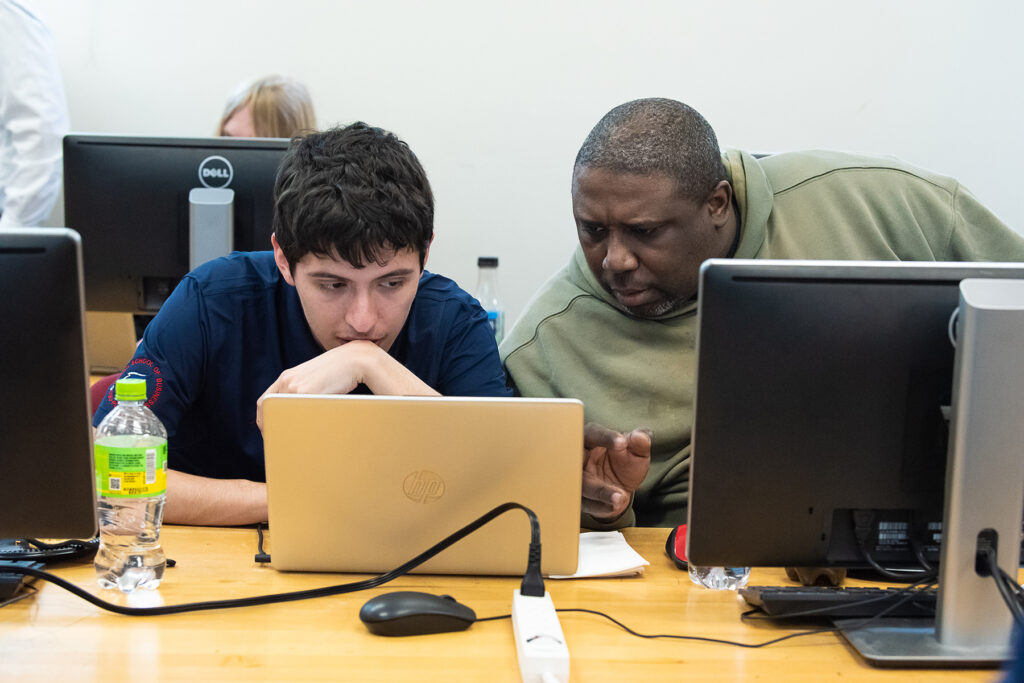
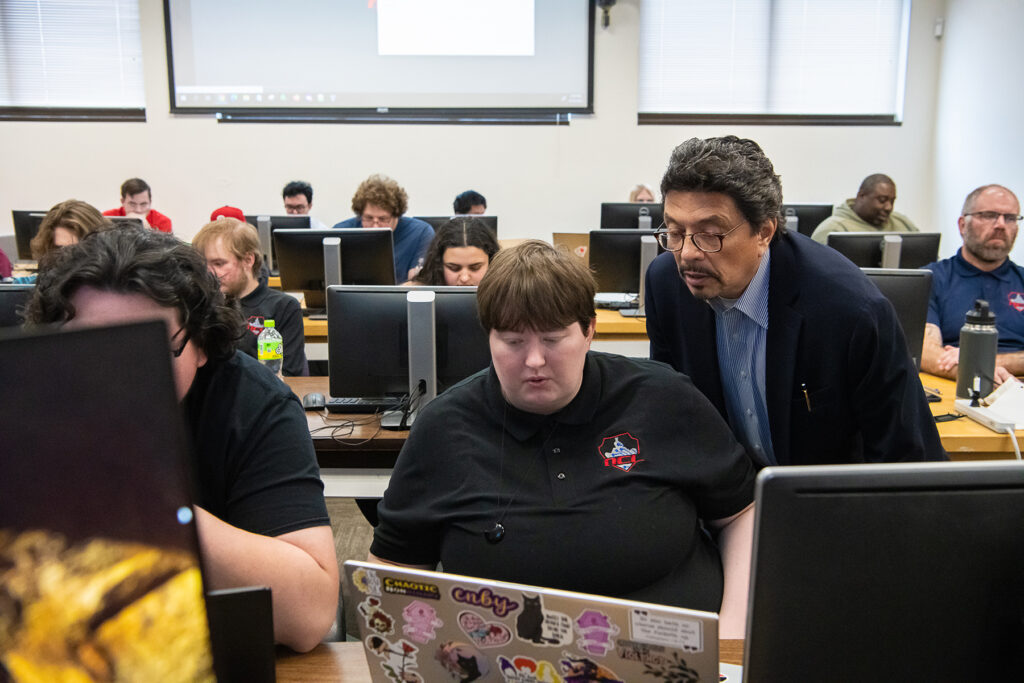
Left: Dillon Batterton, left, and Rhode Gachette, members of the CSU Pueblo CyberWolves, confer during the National Cyber League competition last spring. Right: Roberto Mejias, head coach of the CSU Pueblo CyberWolves, checks in with Ryan Ryker during the national tournament.
Top: Dillon Batterton, left, and Rhode Gachette, members of the CSU Pueblo CyberWolves, confer during the National Cyber League competition last spring. Bottom: Roberto Mejias, head coach of the CSU Pueblo CyberWolves, checks in with Ryan Ryker during the national tournament.
MEJIAS CAME TO CSU PUEBLO in 2013 and, since then, his relentless focus has been on building the cybersecurity program through partnerships and funding. In 2020, with $2.5 million from the National Science Foundation and another $1 million from the state Legislature, CSU Pueblo launched an initiative with Pikes Peak State College and Pueblo Community College to financially support students and help them seamlessly leverage associate degrees into bachelor’s degrees in cybersecurity. The project is called “PUENTE,” Spanish for “bridge.” The name reflects the program’s purpose and the university’s designation as a Hispanic-Serving Institution, which made CSU Pueblo eligible for the federal funds. Project PUENTE aims to help diversify the field by encouraging more Hispanics, women, and students from other underrepresented groups to help close a serious workforce gap in cybersecurity.
Another program, with Arapahoe Community College, is based at the Sturm Collaboration Campus in Castle Rock, where the CSU System is a partner. In May, the first class of nine students attained bachelor’s degrees in cybersecurity from CSU Pueblo after completing course work at the Sturm campus and online.
A fourth-generation Mexican American, Mejias talks about family members who have served in the U.S. military since World War I. For him, training students in cybersecurity is a patriotic duty – a way of strengthening U.S. national security. “This is my way of serving my country,” he says. He was a first-generation college student, earning a bachelor’s degree, master’s degree, and Ph.D. in business, production management, and technology from the University of Arizona. His background makes Mejias a singular mentor and role model for students at CSU Pueblo, where about 35 percent of the student body is Hispanic and many students likewise are the first in their families to earn college degrees.
“We’re way behind China, North Korea, and Russia – they start cultivating their cyberwarriors in fifth and sixth grade, and we’re just catching up. ”
— Roberto Mejias, director, CSU Pueblo Center for Cyber Security Education and Research
HIS SENSE OF DUTY includes student support. “We do a lot of counseling, both in and out of the classroom,” he says. Mejias, who has been honored with teaching awards from his campus and the CSU System, talks regularly with parents and other family members about job offers or potential career paths. At times, he refers to students as his kids. “I feel like an uncle or a stepdad,” he says with a laugh.
That fits, say Josh Greer and Gabi Garcia Greer. The husband and wife met at CSU Pueblo, completed cybersecurity studies with Mejias about six years ago, and, with his encouragement, went on to master’s degrees in management information systems. They were awarded full-ride scholarships for graduate studies at the University of Arizona. Now, both work in cybersecurity for the Department of Defense in Washington, D.C.
“For me, waking up and knowing I’m contributing to our national security is really rewarding,” Josh Greer says. “There’s critical infrastructure we need to protect in order to protect our citizens and our neighbors. It’s a dream to know we’re making a difference. I feel like I’m answering a call.”

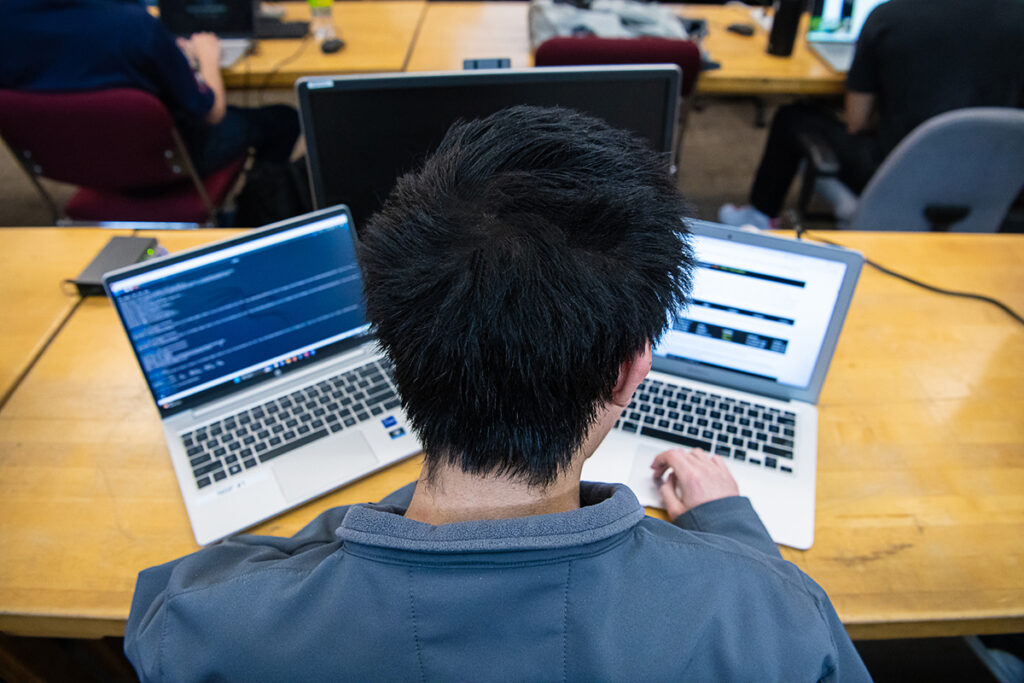
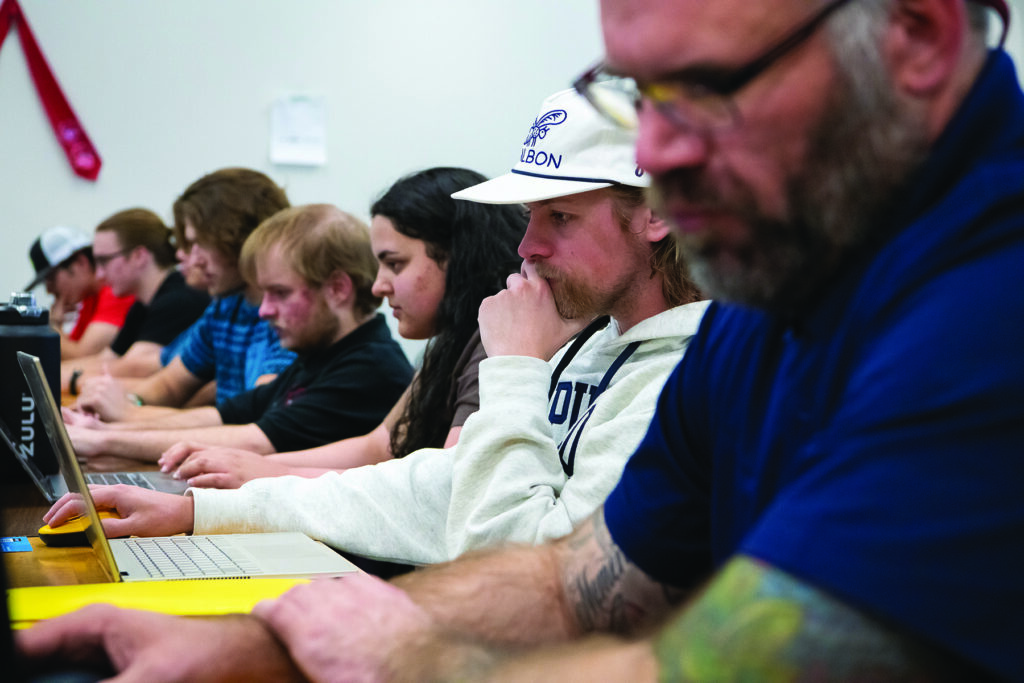
Left: Kevin Shu, the top competitor on the CyberWolves team, placed No. 19 of about 6,000 students in the National Cyber League tournament last spring. Right: Engrossed in challenges during the competition are, from left, Luis Contreras, Colin Sheehan, Ravyn Fairchild, Patrick Colletti, Lillian Cunha, Wyatt Sheley, and Dustan Johnson.
Top: Kevin Shu, the top competitor on the CyberWolves team, placed No. 19 of about 6,000 students in the National Cyber League tournament last spring. Bottom: Engrossed in challenges during the competition are, from left, Luis Contreras, Colin Sheehan, Ravyn Fairchild, Patrick Colletti, Lillian Cunha, Wyatt Sheley, and Dustan Johnson.
In 2022, the National Security Agency conducted a rigorous review of the CSU Pueblo Center for Cyber Security Education and Research. The federal agency then renewed the program’s designation as a National Center of Academic Excellence in Cyber Defense. Along with similar centers across the country and in Colorado, the CSU Pueblo program is preparing students for careers in cybersecurity – a discipline with more than 750,000 unfilled jobs in this country alone, according to an estimate from CyberSeek, a project involving the National Institute of Standards and Technology. CyberSeek calls on colleges and universities to “hack the gap.”
The need for cybersecurity professionals is projected to grow, as malicious emails and text messages flood devices, ransomware attacks hamper hospitals and police departments, and news about ChatGPT and other machine-learning language models heralds a future of escalating digital uncertainty. A 2021 attack on the Colonial Pipeline, which supplies gasoline and jet fuel to several Southeastern states, highlights the growing disruptive potential of hacking from foreign entities. Gas shortages dominated headlines for days before pipeline operators met the attackers’ multimillion- dollar ransom demand with a payment in cryptocurrency.
“For me, waking up and knowing I’m contributing to our national security is really rewarding. I feel like I’m answering a call. ”
— Josh Greer, CSU Pueblo alumnus
THE DIGITAL WORLD is also a critical battleground in international conflict, including the war in Ukraine. According to the New York Times, Ukrainian officials report daily cyberattacks numbering in the double digits as Russian hackers try to disrupt the energy sector, the military, and other key targets. Alongside those direct attacks are more pernicious efforts to weaken international support for Ukraine by spreading misinformation and manipulating social media.
“It’s a constant cat-and-mouse game,” says Steven Ullman, who graduated in 2018 from CSU Pueblo with a bachelor’s degree in computer information systems and a concentration in cybersecurity. He went on to a master’s degree in management information systems at the University of Arizona, a cybersecurity powerhouse, and now is there working on a doctorate.
Ullman is fascinated by the speed of change in cybersecurity as emerging technologies unleash new threats. His dissertation research will explore the use of artificial intelligence in managing computer system vulnerabilities.
Meantime, Ullman is working with Mejias and his adviser at the University of Arizona to build research capacity and strengthen connections between the two schools. They recently landed a $600,000 grant from the National Science Foundation to fund CSU Pueblo scholarships and a new course that delves into the use of artificial intelligence and data analytics in cybersecurity. Ullman joins by video call to instruct Pueblo undergraduates in the latest techniques used by a leading research university to expand cybersecurity’s frontier.
Mejias encourages collaboration from the time students enter the CSU Pueblo program. During the National Cyber League tournament, Rhode Gachette, 50, confers with a CyberWolves teammate on a steganography challenge. His teammate uncovers a coded message hidden in an image that appears, on the surface, to be a travel snapshot from Italy. Gachette then finds the correct cipher to use in decrypting the message after realizing it has been reversed and is in a different language. “It feels so great to figure it out,” he says.
Gachette spent 15 years in the Army and worked in the private sector before arriving at CSU Pueblo. Now, he is working toward a degree in computer information systems, with an emphasis in cybersecurity, as well as an MBA and multiple minors. His career plans are guided by a sense of possibility.
“I’ve had more support than I ever thought I would,” Gachette says of his time at CSU Pueblo. “I’m not going to waste this opportunity.”
Photo at top: Roberto Mejias is an associate professor of computer information systems and directs the CSU Pueblo Center for Cyber Security Education and Research. It is designated by the National Security Agency as a National Center of Academic Excellence in Cyber Defense and trains students to fill a workforce gap in the burgeoning field of cybersecurity.
SHARE
